The Cambridge History of China. Vol. 13: Republican China 1912-1949, Part 2
Подождите немного. Документ загружается.

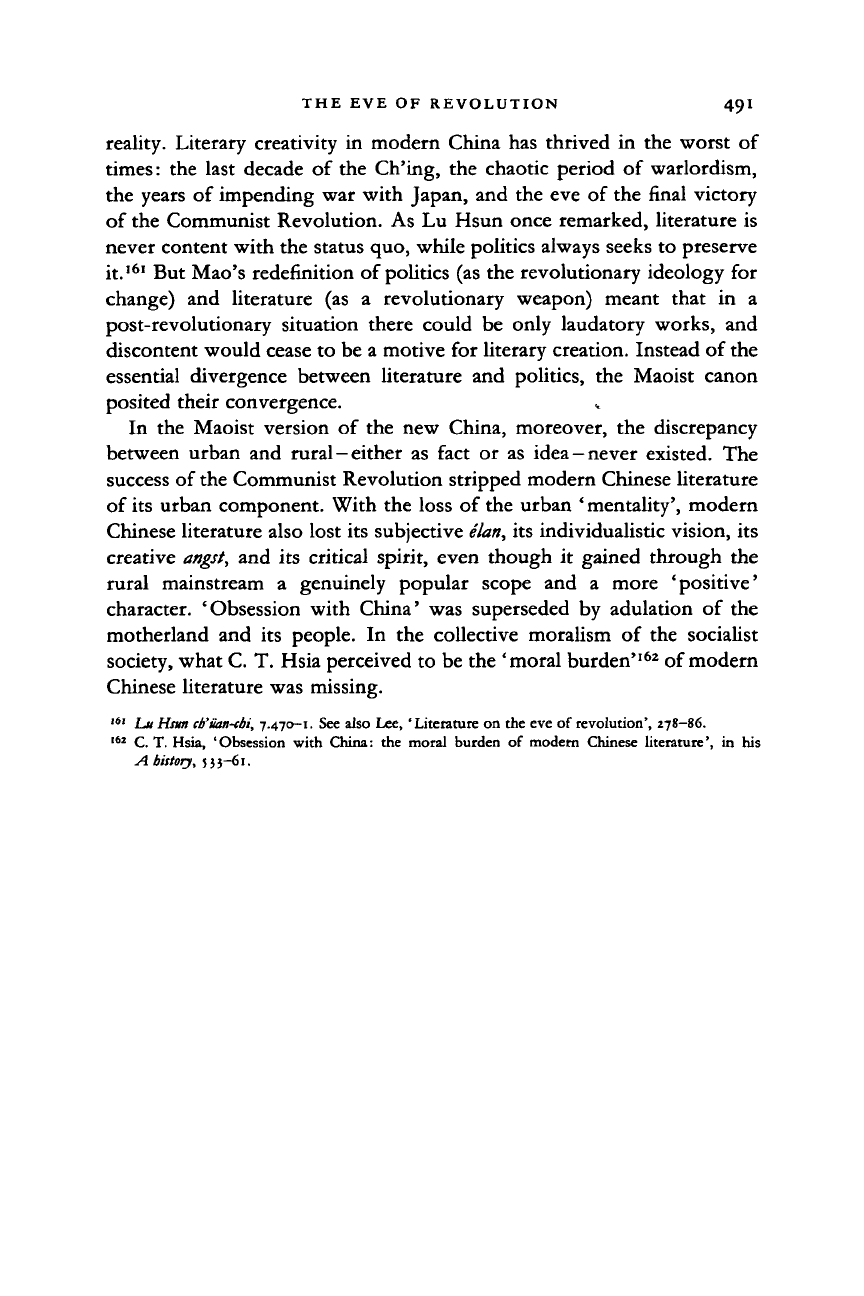
THE EVE OF
REVOLUTION
49I
reality. Literary creativity in modern China has thrived in the worst of
times:
the last decade of the Ch'ing, the chaotic period of warlordism,
the years of impending war with Japan, and the eve of the final victory
of the Communist Revolution. As Lu Hsun once remarked, literature is
never content with the status quo, while politics always seeks to preserve
it.
161
But Mao's redefinition of politics (as the revolutionary ideology for
change) and literature (as a revolutionary weapon) meant that in a
post-revolutionary situation there could be only laudatory works, and
discontent would cease to be a motive for literary creation. Instead of the
essential divergence between literature and politics, the Maoist canon
posited their convergence. *
In the Maoist version of the new China, moreover, the discrepancy
between urban and rural —either as fact or as idea —never existed. The
success of the Communist Revolution stripped modern Chinese literature
of its urban component. With the loss of the urban ' mentality', modern
Chinese literature also lost its subjective
elan,
its individualistic vision, its
creative
angst,
and its critical spirit, even though it gained through the
rural mainstream a genuinely popular scope and a more 'positive'
character. 'Obsession with China' was superseded by adulation of the
motherland and its people. In the collective moralism of the socialist
society, what C. T. Hsia perceived to be the 'moral burden'
162
of modern
Chinese literature was missing.
161
Lu
Hsun
ctfwn-cbi, 7.470-1. See also Lee, 'Literature on the eve of revolution', 278-86.
162
C. T. Hsia, 'Obsession with China: the moral burden of modern Chinese literature', in his
A history \
553-61.
Cambridge Histories Online © Cambridge University Press, 2008
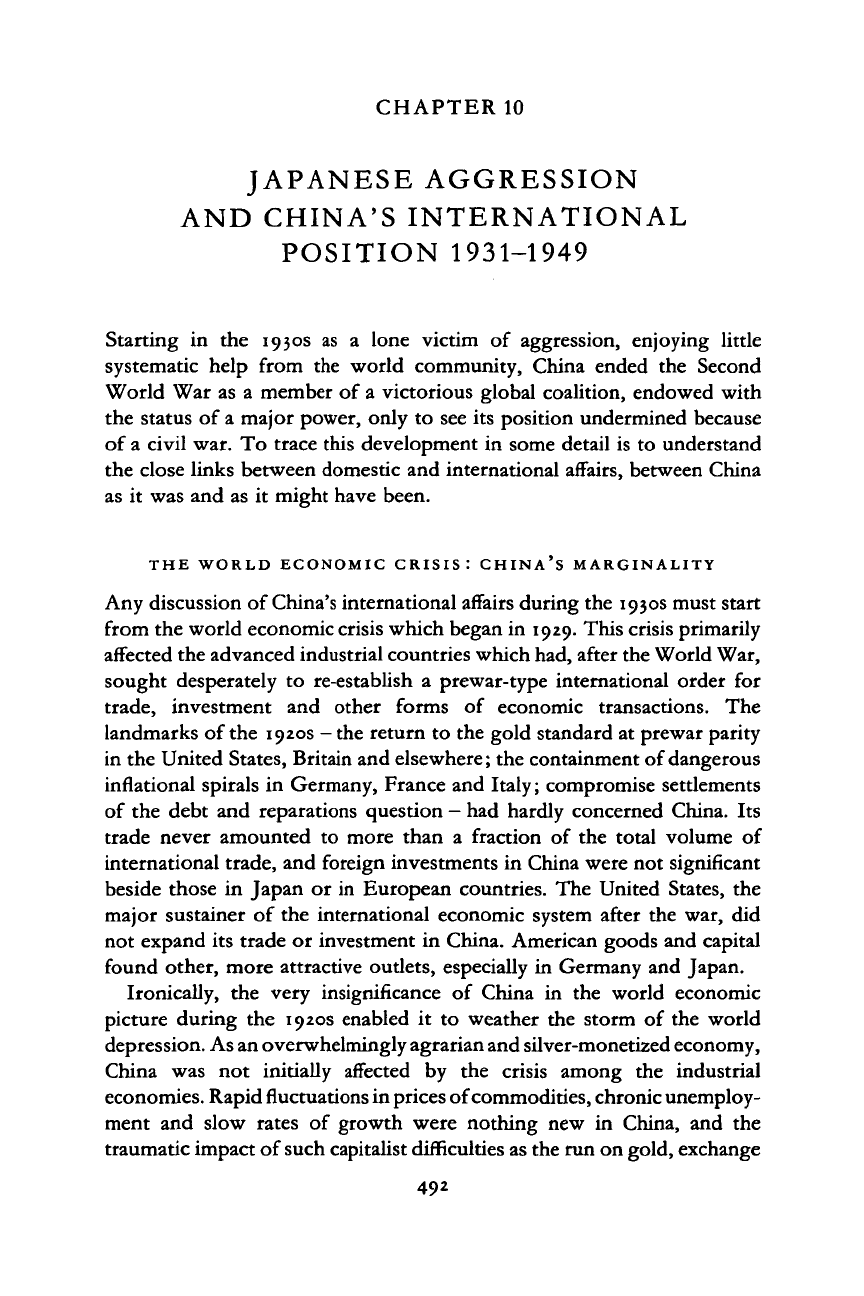
CHAPTER 10
JAPANESE AGGRESSION
AND CHINA'S INTERNATIONAL
POSITION 1931-1949
Starting
in the
1930s
as a
lone victim
of
aggression, enjoying little
systematic help from
the
world community, China ended
the
Second
World War as
a
member
of
a victorious global coalition, endowed with
the status
of
a major power, only
to
see its position undermined because
of a civil war. To trace this development
in
some detail
is to
understand
the close links between domestic and international affairs, between China
as
it
was and as
it
might have been.
THE WORLD ECONOMIC CRISIS: CHINA'S MARGINALITY
Any discussion of China's international affairs during the 1930s must start
from the world economic crisis which began in 1929. This crisis primarily
affected the advanced industrial countries which had, after the World War,
sought desperately
to
re-establish
a
prewar-type international order
for
trade, investment
and
other forms
of
economic transactions.
The
landmarks of the 1920s
-
the return
to
the gold standard at prewar parity
in the United States, Britain and elsewhere; the containment of dangerous
inflational spirals
in
Germany, France and Italy; compromise settlements
of the debt
and
reparations question
—
had hardly concerned China.
Its
trade never amounted
to
more than
a
fraction
of
the total volume
of
international trade, and foreign investments in China were not significant
beside those
in
Japan
or
in European countries. The United States,
the
major sustainer
of
the international economic system after the war,
did
not expand its trade
or
investment
in
China. American goods and capital
found other, more attractive outlets, especially
in
Germany and Japan.
Ironically,
the
very insignificance
of
China
in the
world economic
picture during
the
1920s enabled
it to
weather the storm
of
the world
depression. As an overwhelmingly agrarian and silver-monetized economy,
China
was not
initially affected
by the
crisis among
the
industrial
economies. Rapid fluctuations in prices of commodities, chronic unemploy-
ment
and
slow rates
of
growth were nothing
new in
China,
and the
traumatic impact of such capitalist difficulties as the run on gold, exchange
492
Cambridge Histories Online © Cambridge University Press, 2008
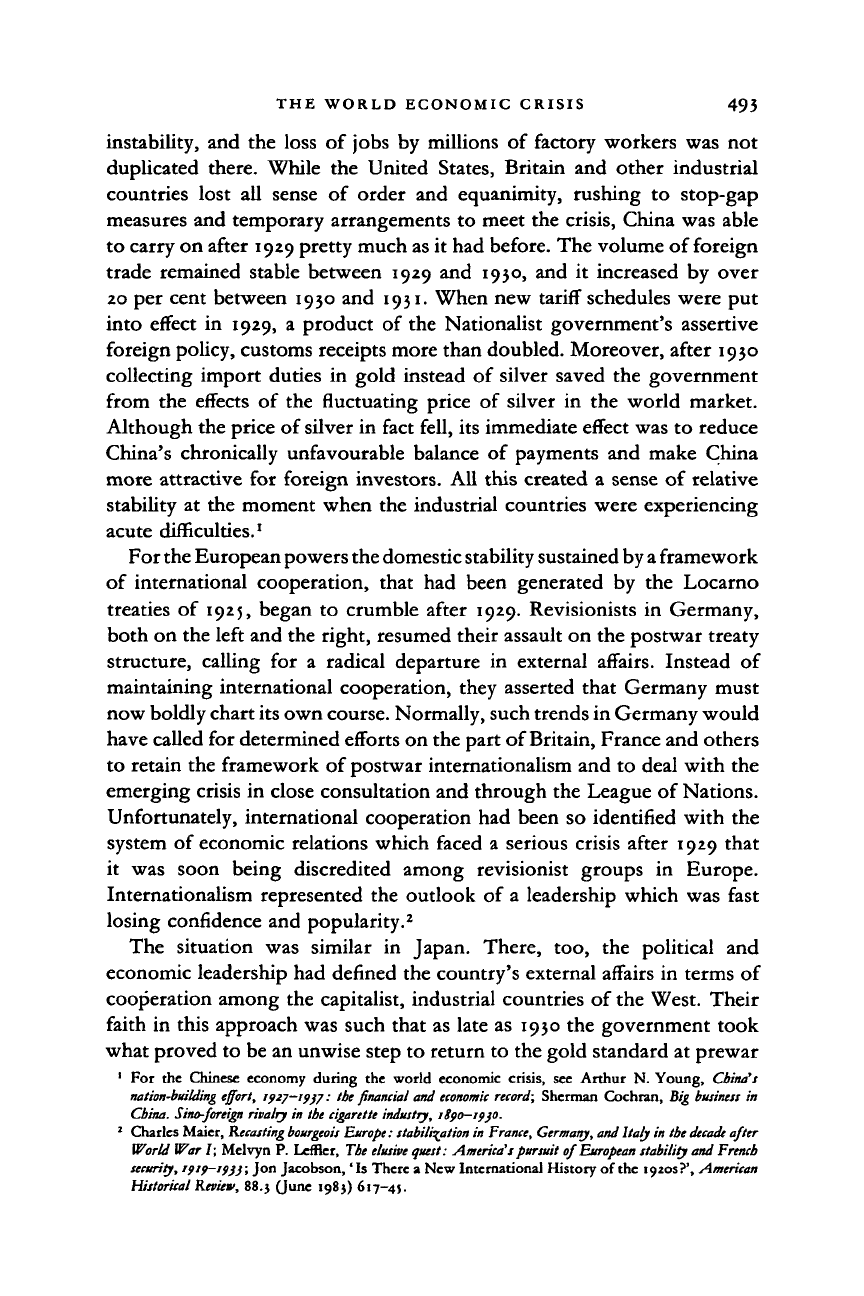
THE WORLD ECONOMIC CRISIS
493
instability,
and the
loss
of
jobs
by
millions
of
factory workers
was not
duplicated there. While
the
United States, Britain
and
other industrial
countries lost
all
sense
of
order
and
equanimity, rushing
to
stop-gap
measures and temporary arrangements
to
meet the crisis, China was able
to carry on after 1929 pretty much as
it
had before. The volume of foreign
trade remained stable between 1929
and
1930,
and it
increased
by
over
20
per
cent between 1930
and
1931. When new tariff schedules were
put
into effect
in
1929,
a
product
of
the Nationalist government's assertive
foreign policy, customs receipts more than doubled. Moreover, after 1930
collecting import duties
in
gold instead
of
silver saved
the
government
from
the
effects
of
the fluctuating price
of
silver
in the
world market.
Although the price
of
silver
in
fact fell, its immediate effect was
to
reduce
China's chronically unfavourable balance
of
payments
and
make China
more attractive
for
foreign investors.
All
this created
a
sense
of
relative
stability
at the
moment when
the
industrial countries were experiencing
acute difficulties.
1
For the European powers the domestic stability sustained
by a
framework
of international cooperation, that
had
been generated
by the
Locarno
treaties
of
1925, began
to
crumble after 1929. Revisionists
in
Germany,
both on the left and the right, resumed their assault
on
the postwar treaty
structure, calling
for a
radical departure
in
external affairs. Instead
of
maintaining international cooperation, they asserted that Germany must
now boldly chart its own course. Normally, such trends in Germany would
have called for determined efforts on the part of Britain, France and others
to retain the framework
of
postwar internationalism and
to
deal with the
emerging crisis
in
close consultation and through the League
of
Nations.
Unfortunately, international cooperation
had
been
so
identified with
the
system
of
economic relations which faced
a
serious crisis after 1929 that
it
was
soon being discredited among revisionist groups
in
Europe.
Internationalism represented
the
outlook
of a
leadership which was fast
losing confidence and popularity.
2
The situation
was
similar
in
Japan. There,
too, the
political
and
economic leadership had defined the country's external affairs
in
terms
of
cooperation among the capitalist, industrial countries
of
the West. Their
faith
in
this approach was such that as late
as
1930
the
government took
what proved
to
be an unwise step
to
return
to
the gold standard
at
prewar
1
For the Chinese economy during the world economic crisis, see Arthur N. Young, China's
natim-building effort, 1927-19)7:
the
financial
and
economic
record; Sherman Cochran,
Big
business
in
China. Sino-joreign rivalry in the cigarette industry, 1/90—19)0.
2
Charles Maier, Recasting
bourgeois
Europe: stabilisation in France, Germany, and Italy in the
decade
after
World
War I;
Melvyn
P.
Leffler, The
elusive
quest: America's pursuit
of
European
stability and
French
security,
1919-193);
Jon Jacobson,' Is There a New International History of the
1920s
?',
American
Historical
Review,
88.j (June 1983) 617-4}.
Cambridge Histories Online © Cambridge University Press, 2008
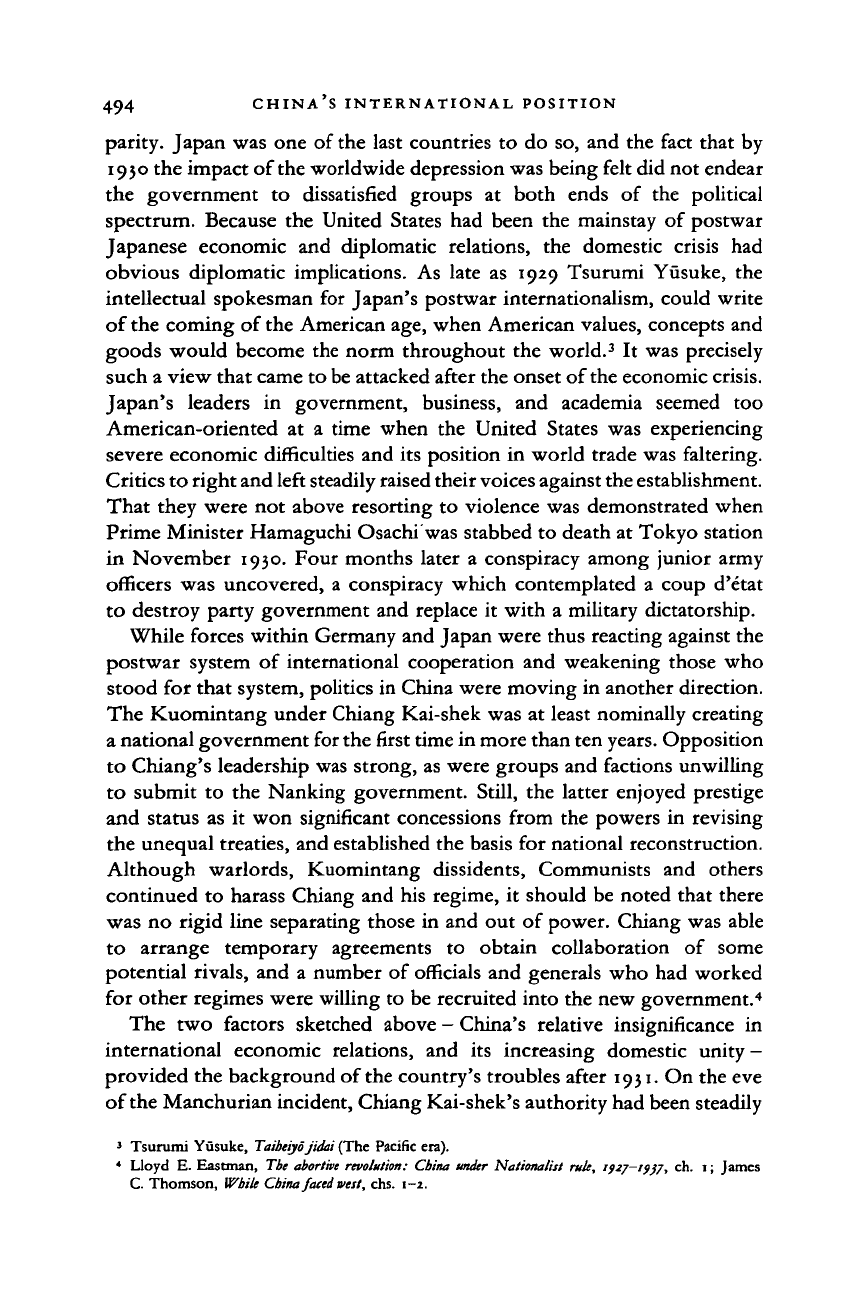
494 CHINA S INTERNATIONAL POSITION
parity. Japan was one of the last countries to do so, and the fact that by
1930 the impact of the worldwide depression was being felt did not endear
the government to dissatisfied groups at both ends of the political
spectrum. Because the United States had been the mainstay of postwar
Japanese economic and diplomatic relations, the domestic crisis had
obvious diplomatic implications. As late as 1929 Tsurumi Yusuke, the
intellectual spokesman for Japan's postwar internationalism, could write
of the coming of the American age, when American values, concepts and
goods would become the norm throughout the world.
3
It was precisely
such a view that came to be attacked after the onset of the economic crisis.
Japan's leaders in government, business, and academia seemed too
American-oriented at a time when the United States was experiencing
severe economic difficulties and its position in world trade was faltering.
Critics to right and left steadily raised their voices against the establishment.
That they were not above resorting to violence was demonstrated when
Prime Minister Hamaguchi Osachi was stabbed to death at Tokyo station
in November 1930. Four months later a conspiracy among junior army
officers was uncovered, a conspiracy which contemplated a coup d'etat
to destroy party government and replace it with a military dictatorship.
While forces within Germany and Japan were thus reacting against the
postwar system of international cooperation and weakening those who
stood for that system, politics in China were moving in another direction.
The Kuomintang under Chiang Kai-shek was at least nominally creating
a national government for the first time in more than ten years. Opposition
to Chiang's leadership was strong, as were groups and factions unwilling
to submit to the Nanking government. Still, the latter enjoyed prestige
and status as it won significant concessions from the powers in revising
the unequal treaties, and established the basis for national reconstruction.
Although warlords, Kuomintang dissidents, Communists and others
continued to harass Chiang and his regime, it should be noted that there
was no rigid line separating those in and out of power. Chiang was able
to arrange temporary agreements to obtain collaboration of some
potential rivals, and a number of officials and generals who had worked
for other regimes were willing to be recruited into the new government.
4
The two factors sketched above - China's relative insignificance in
international economic relations, and its increasing domestic unity -
provided the background of the country's troubles after
1931.
On the eve
of the Manchurian incident, Chiang Kai-shek's authority had been steadily
3
Tsurumi Yusuke, Taibeijojidai (The Pacific era).
4
Lloyd E. Eastman, The abortive revolution: China under Nationalist rule, if'27-19)7, ch. 1; James
C.
Thomson, While China faced vest, chs. 1-2.
Cambridge Histories Online © Cambridge University Press, 2008
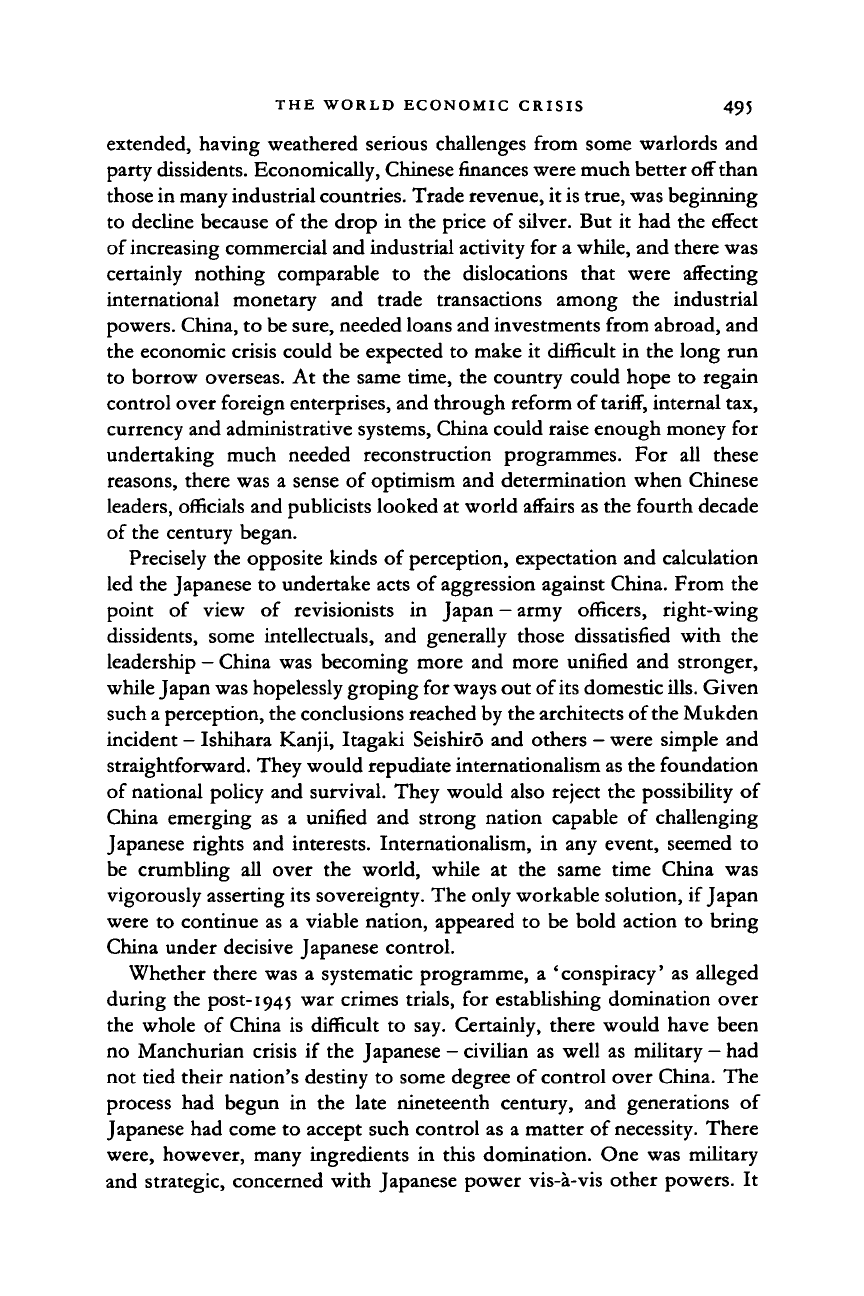
THE WORLD ECONOMIC CRISIS 495
extended, having weathered serious challenges from some warlords and
party dissidents. Economically, Chinese
finances
were much better off than
those in many industrial countries. Trade revenue, it is true, was beginning
to decline because of the drop in the price of silver. But it had the effect
of increasing commercial and industrial activity for a while, and there was
certainly nothing comparable to the dislocations that were affecting
international monetary and trade transactions among the industrial
powers. China, to be sure, needed loans and investments from abroad, and
the economic crisis could be expected to make it difficult in the long run
to borrow overseas. At the same time, the country could hope to regain
control over foreign enterprises, and through reform of
tariff,
internal tax,
currency and administrative systems, China could raise enough money for
undertaking much needed reconstruction programmes. For all these
reasons, there was a sense of optimism and determination when Chinese
leaders, officials and publicists looked at world affairs as the fourth decade
of the century began.
Precisely the opposite kinds of perception, expectation and calculation
led the Japanese to undertake acts of aggression against China. From the
point of view of revisionists in Japan - army officers, right-wing
dissidents, some intellectuals, and generally those dissatisfied with the
leadership - China was becoming more and more unified and stronger,
while Japan was hopelessly groping for ways out of its domestic
ills.
Given
such a perception, the conclusions reached by the architects of the Mukden
incident - Ishihara Kanji, Itagaki Seishiro and others - were simple and
straightforward. They would repudiate internationalism as the foundation
of national policy and survival. They would also reject the possibility of
China emerging as a unified and strong nation capable of challenging
Japanese rights and interests. Internationalism, in any event, seemed to
be crumbling all over the world, while at the same time China was
vigorously asserting its sovereignty. The only workable solution, if Japan
were to continue as a viable nation, appeared to be bold action to bring
China under decisive Japanese control.
Whether there was a systematic programme, a 'conspiracy' as alleged
during the post-1945 war crimes trials, for establishing domination over
the whole of China is difficult to say. Certainly, there would have been
no Manchurian crisis if the Japanese - civilian as well as military - had
not tied their nation's destiny to some degree of control over China. The
process had begun in the late nineteenth century, and generations of
Japanese had come to accept such control as a matter of necessity. There
were, however, many ingredients in this domination. One was military
and strategic, concerned with Japanese power vis-a-vis other powers. It
Cambridge Histories Online © Cambridge University Press, 2008
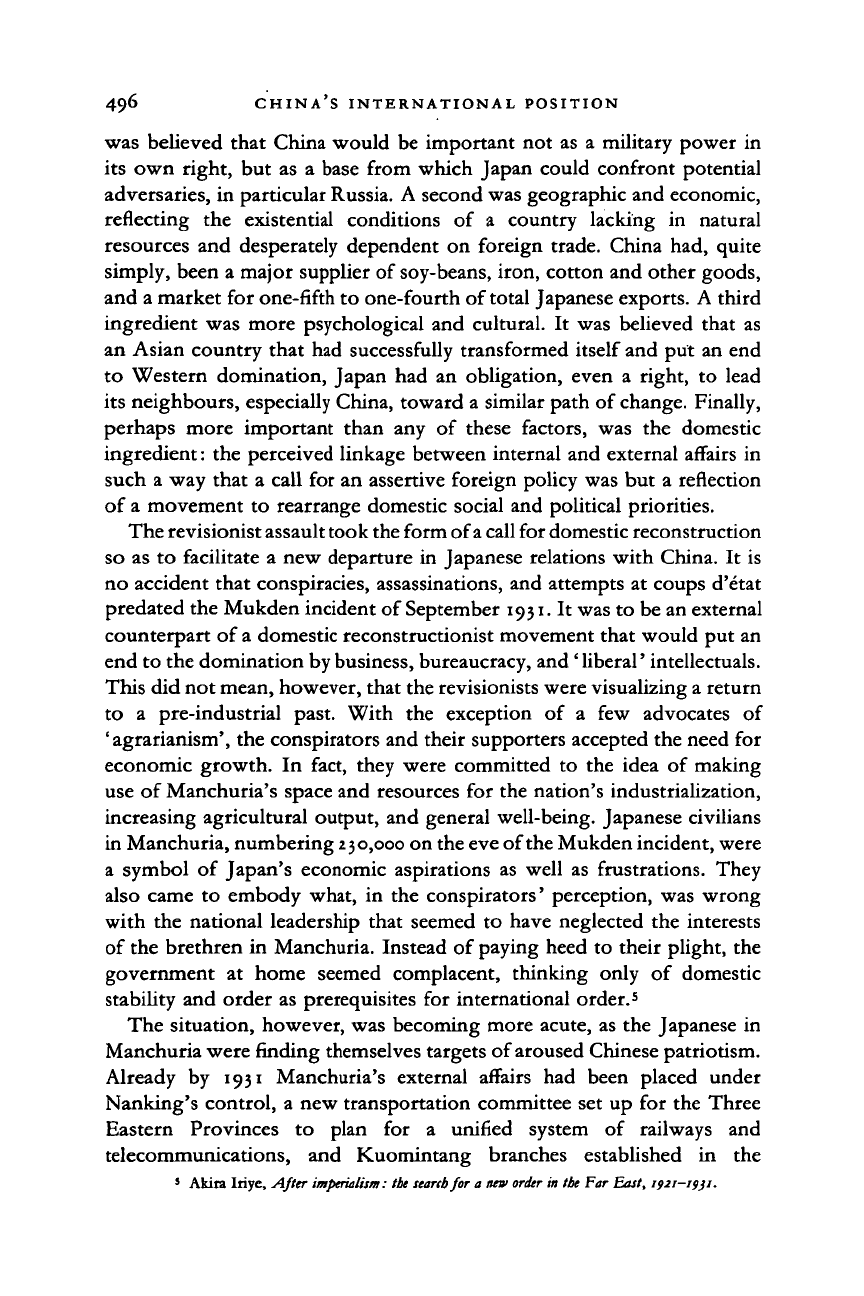
496 CHINA'S INTERNATIONAL POSITION
was believed that China would be important not as a military power in
its own right, but as a base from which Japan could confront potential
adversaries, in particular Russia. A second was geographic and economic,
reflecting the existential conditions of a country lacking in natural
resources and desperately dependent on foreign trade. China had, quite
simply, been a major supplier of soy-beans, iron, cotton and other goods,
and a market for one-fifth to one-fourth of total Japanese exports. A third
ingredient was more psychological and cultural. It was believed that as
an Asian country that had successfully transformed itself and put an end
to Western domination, Japan had an obligation, even a right, to lead
its neighbours, especially China, toward a similar path of
change.
Finally,
perhaps more important than any of these factors, was the domestic
ingredient: the perceived linkage between internal and external affairs in
such a way that a call for an assertive foreign policy was but a reflection
of a movement to rearrange domestic social and political priorities.
The revisionist assault took the form of
a
call for domestic reconstruction
so as to facilitate a new departure in Japanese relations with China. It is
no accident that conspiracies, assassinations, and attempts at coups d'etat
predated the Mukden incident of September
1931.
It was to be an external
counterpart of a domestic reconstructionist movement that would put an
end to the domination by
business,
bureaucracy, and 'liberal' intellectuals.
This did not mean, however, that the revisionists were visualizing a return
to a pre-industrial past. With the exception of a few advocates of
'agrarianism', the conspirators and their supporters accepted the need for
economic growth. In fact, they were committed to the idea of making
use of Manchuria's space and resources for the nation's industrialization,
increasing agricultural output, and general well-being. Japanese civilians
in Manchuria, numbering 230,000 on the eve of the Mukden incident, were
a symbol of Japan's economic aspirations as well as frustrations. They
also came to embody what, in the conspirators' perception, was wrong
with the national leadership that seemed to have neglected the interests
of the brethren in Manchuria. Instead of paying heed to their plight, the
government at home seemed complacent, thinking only of domestic
stability and order as prerequisites for international order.
5
The situation, however, was becoming more acute, as the Japanese in
Manchuria were rinding themselves targets of aroused Chinese patriotism.
Already by 1931 Manchuria's external affairs had been placed under
Nanking's control, a new transportation committee set up for the Three
Eastern Provinces to plan for a unified system of railways and
telecommunications, and Kuomintang branches established in the
5
Akira Iriye, After imperialism: the search for a new order in the Far East, ifii—ifji.
Cambridge Histories Online © Cambridge University Press, 2008
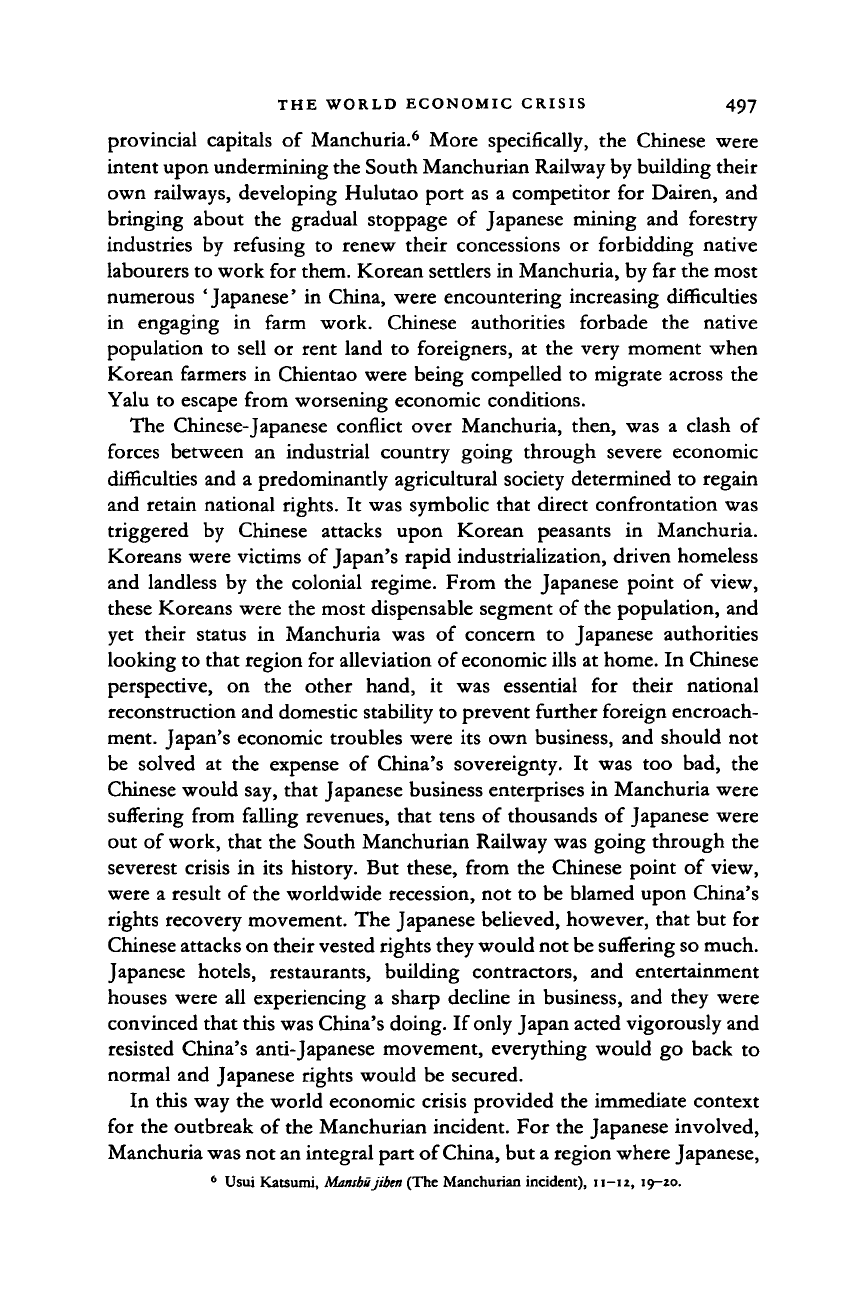
THE WORLD ECONOMIC CRISIS 497
provincial capitals
of
Manchuria.
6
More specifically,
the
Chinese were
intent upon undermining the South Manchurian Railway by building their
own railways, developing Hulutao port
as a
competitor
for
Dairen,
and
bringing about
the
gradual stoppage
of
Japanese mining
and
forestry
industries
by
refusing
to
renew their concessions
or
forbidding native
labourers to work
for
them. Korean settlers
in
Manchuria, by far the most
numerous 'Japanese'
in
China, were encountering increasing difficulties
in engaging
in
farm work. Chinese authorities forbade
the
native
population
to
sell
or
rent land
to
foreigners,
at the
very moment when
Korean farmers
in
Chientao were being compelled
to
migrate across
the
Yalu
to
escape from worsening economic conditions.
The Chinese-Japanese conflict over Manchuria, then,
was a
clash
of
forces between
an
industrial country going through severe economic
difficulties
and a
predominantly agricultural society determined
to
regain
and retain national rights.
It
was symbolic that direct confrontation
was
triggered
by
Chinese attacks upon Korean peasants
in
Manchuria.
Koreans were victims
of
Japan's rapid industrialization, driven homeless
and landless
by the
colonial regime. From
the
Japanese point
of
view,
these Koreans were
the
most dispensable segment
of
the population,
and
yet their status
in
Manchuria
was of
concern
to
Japanese authorities
looking
to
that region
for
alleviation
of
economic ills
at
home.
In
Chinese
perspective,
on the
other hand,
it was
essential
for
their national
reconstruction and domestic stability to prevent further foreign encroach-
ment. Japan's economic troubles were
its own
business,
and
should
not
be solved
at the
expense
of
China's sovereignty.
It was too bad, the
Chinese would say, that Japanese business enterprises
in
Manchuria were
suffering from falling revenues, that tens
of
thousands
of
Japanese were
out
of
work, that
the
South Manchurian Railway was going through
the
severest crisis
in its
history.
But
these, from
the
Chinese point
of
view,
were
a
result
of
the worldwide recession,
not to be
blamed upon China's
rights recovery movement. The Japanese believed, however, that
but for
Chinese attacks on their vested rights they would not be suffering so much.
Japanese hotels, restaurants, building contractors,
and
entertainment
houses were
all
experiencing
a
sharp decline
in
business,
and
they were
convinced that this was China's doing.
If
only Japan acted vigorously and
resisted China's anti-Japanese movement, everything would
go
back
to
normal
and
Japanese rights would
be
secured.
In this way
the
world economic crisis provided
the
immediate context
for
the
outbreak
of
the Manchurian incident.
For
the Japanese involved,
Manchuria was not an integral part of China, but a region where Japanese,
6
Usui Katsumi,
Maiubujiben
(The Manchurian incident), 11-12, 19-20.
Cambridge Histories Online © Cambridge University Press, 2008
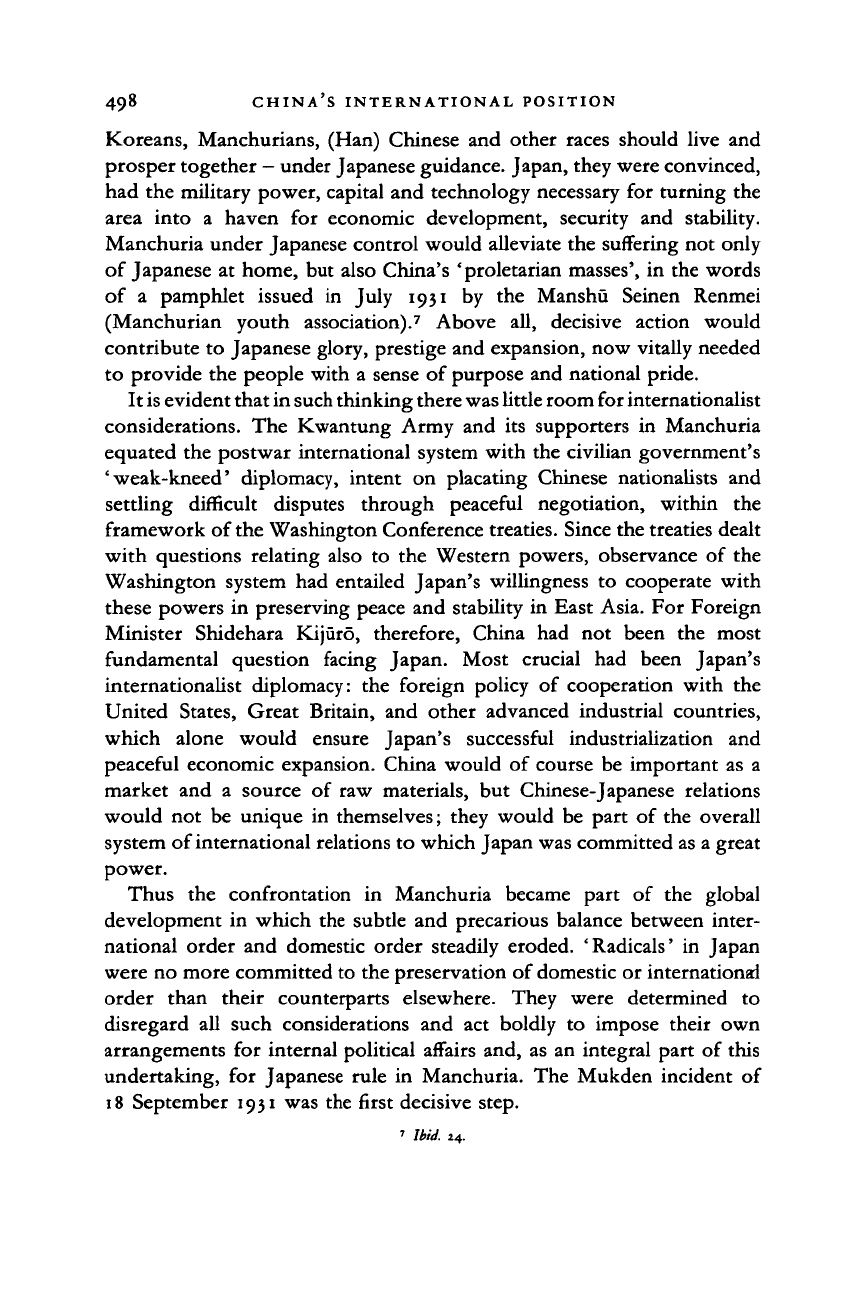
498 CHINA'S INTERNATIONAL POSITION
Koreans, Manchurians, (Han) Chinese and other races should live and
prosper together - under Japanese guidance. Japan, they were convinced,
had the military power, capital and technology necessary for turning the
area into a haven for economic development, security and stability.
Manchuria under Japanese control would alleviate the suffering not only
of Japanese at home, but also China's 'proletarian masses', in the words
of a pamphlet issued in July 1931 by the Manshu Seinen Renmei
(Manchurian youth association).
7
Above all, decisive action would
contribute to Japanese glory, prestige and expansion, now vitally needed
to provide the people with a sense of purpose and national pride.
It
is
evident that in such thinking there was little room for internationalist
considerations. The Kwantung Army and its supporters in Manchuria
equated the postwar international system with the civilian government's
'weak-kneed' diplomacy, intent on placating Chinese nationalists and
settling difficult disputes through peaceful negotiation, within the
framework of the Washington Conference treaties. Since the treaties dealt
with questions relating also to the Western powers, observance of the
Washington system had entailed Japan's willingness to cooperate with
these powers in preserving peace and stability in East Asia. For Foreign
Minister Shidehara Kijuro, therefore, China had not been the most
fundamental question facing Japan. Most crucial had been Japan's
internationalist diplomacy: the foreign policy of cooperation with the
United States, Great Britain, and other advanced industrial countries,
which alone would ensure Japan's successful industrialization and
peaceful economic expansion. China would of course be important as a
market and a source of raw materials, but Chinese-Japanese relations
would not be unique in themselves; they would be part of the overall
system of international relations to which Japan was committed as a great
power.
Thus the confrontation in Manchuria became part of the global
development in which the subtle and precarious balance between inter-
national order and domestic order steadily eroded. 'Radicals' in Japan
were no more committed to the preservation of domestic or international
order than their counterparts elsewhere. They were determined to
disregard all such considerations and act boldly to impose their own
arrangements for internal political affairs and, as an integral part of this
undertaking, for Japanese rule in Manchuria. The Mukden incident of
18 September 1931 was the first decisive step.
'
Ibid.
24.
Cambridge Histories Online © Cambridge University Press, 2008
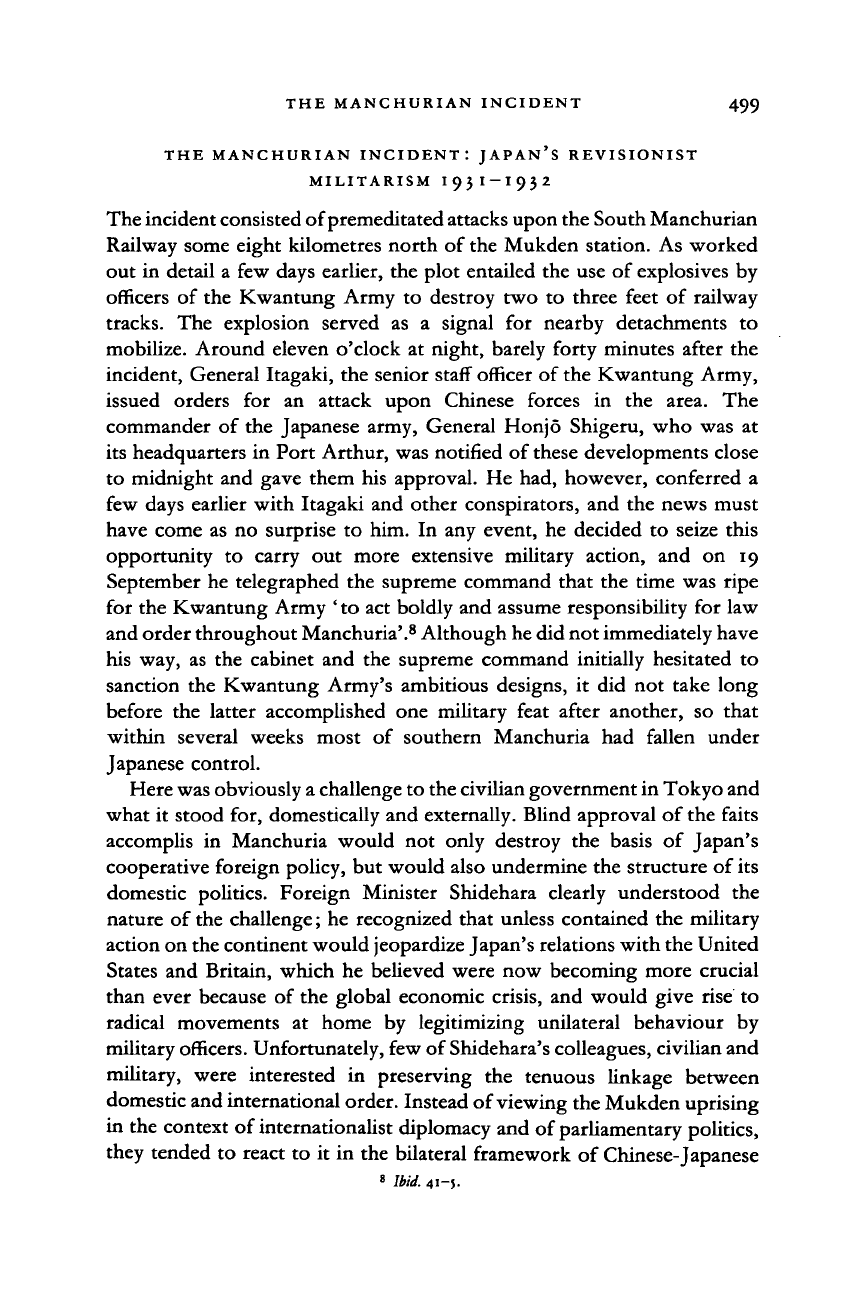
THE MANCHURIAN INCIDENT 499
THE MANCHURIAN INCIDENT: JAPAN'S REVISIONIST
MILITARISM I93I-I932
The incident consisted of premeditated attacks upon the South Manchurian
Railway some eight kilometres north of the Mukden station. As worked
out in detail a few days earlier, the plot entailed the use of explosives by
officers of the Kwantung Army to destroy two to three feet of railway
tracks. The explosion served as a signal for nearby detachments to
mobilize. Around eleven o'clock at night, barely forty minutes after the
incident, General Itagaki, the senior staff officer of the Kwantung Army,
issued orders for an attack upon Chinese forces in the area. The
commander of the Japanese army, General Honjo Shigeru, who was at
its headquarters in Port Arthur, was notified of these developments close
to midnight and gave them his approval. He had, however, conferred a
few days earlier with Itagaki and other conspirators, and the news must
have come as no surprise to him. In any event, he decided to seize this
opportunity to carry out more extensive military action, and on 19
September he telegraphed the supreme command that the time was ripe
for the Kwantung Army ' to act boldly and assume responsibility for law
and order throughout Manchuria'.
8
Although he did not immediately have
his way, as the cabinet and the supreme command initially hesitated to
sanction the Kwantung Army's ambitious designs, it did not take long
before the latter accomplished one military feat after another, so that
within several weeks most of southern Manchuria had fallen under
Japanese control.
Here was obviously a challenge to the civilian government in Tokyo and
what it stood for, domestically and externally. Blind approval of the faits
accomplis in Manchuria would not only destroy the basis of Japan's
cooperative foreign policy, but would also undermine the structure of its
domestic politics. Foreign Minister Shidehara clearly understood the
nature of the challenge; he recognized that unless contained the military
action on the continent would jeopardize Japan's relations with the United
States and Britain, which he believed were now becoming more crucial
than ever because of the global economic crisis, and would give rise to
radical movements at home by legitimizing unilateral behaviour by
military officers. Unfortunately, few of Shidehara's colleagues, civilian and
military, were interested in preserving the tenuous linkage between
domestic and international order. Instead of viewing the Mukden uprising
in the context of internationalist diplomacy and of parliamentary politics,
they tended to react to it in the bilateral framework of Chinese-Japanese
8
Ibid.
41-5.
Cambridge Histories Online © Cambridge University Press, 2008
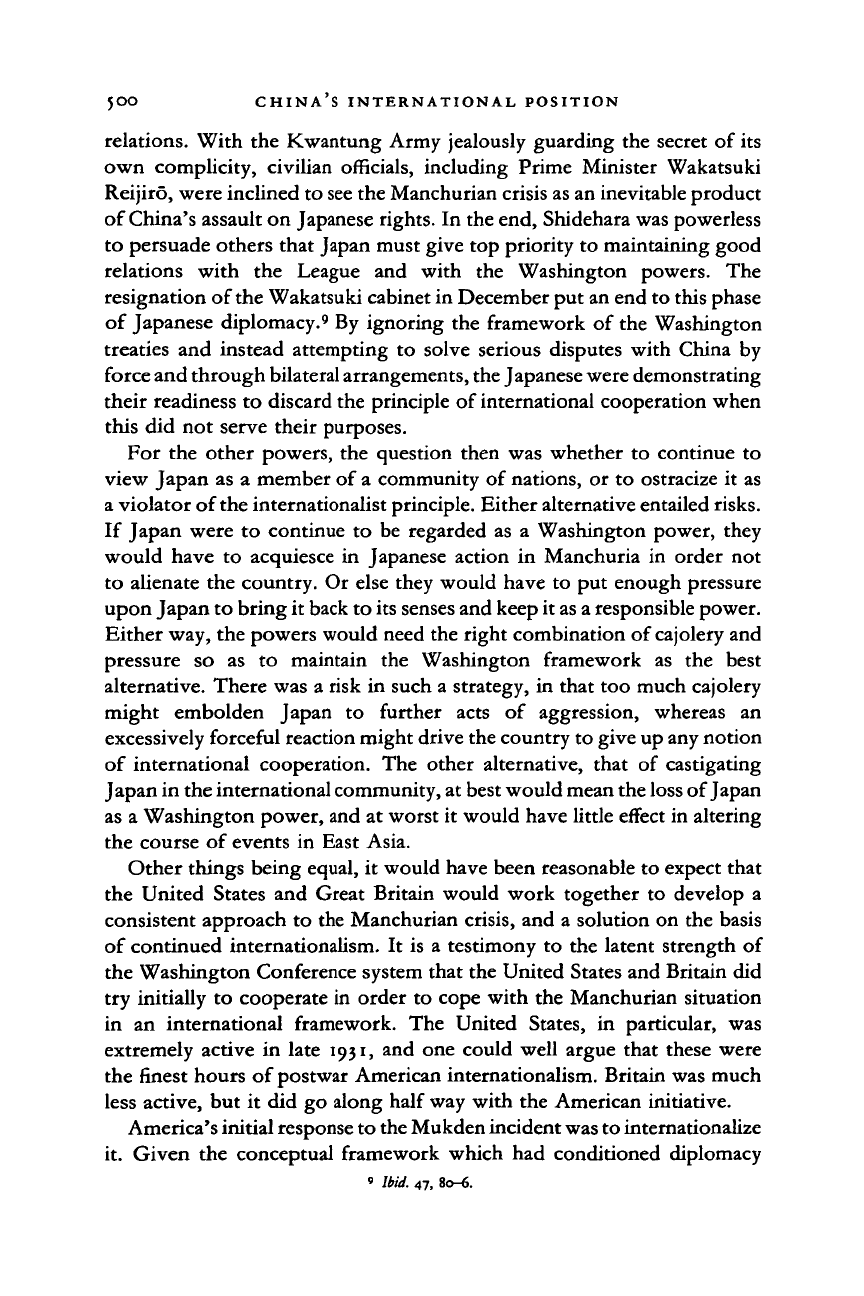
5OO CHINA S INTERNATIONAL POSITION
relations. With the Kwantung Army jealously guarding the secret of its
own complicity, civilian officials, including Prime Minister Wakatsuki
Reijiro, were inclined to see the Manchurian crisis as an inevitable product
of China's assault on Japanese rights. In the end, Shidehara was powerless
to persuade others that Japan must give top priority to maintaining good
relations with the League and with the Washington powers. The
resignation of the Wakatsuki cabinet in December put an end to this phase
of Japanese diplomacy.
9
By ignoring the framework of the Washington
treaties and instead attempting to solve serious disputes with China by
force and through bilateral arrangements, the Japanese were demonstrating
their readiness to discard the principle of international cooperation when
this did not serve their purposes.
For the other powers, the question then was whether to continue to
view Japan as a member of a community of nations, or to ostracize it as
a violator of the internationalist principle. Either alternative entailed risks.
If Japan were to continue to be regarded as a Washington power, they
would have to acquiesce in Japanese action in Manchuria in order not
to alienate the country. Or else they would have to put enough pressure
upon Japan to bring it back to its senses and keep it as a responsible power.
Either way, the powers would need the right combination of cajolery and
pressure so as to maintain the Washington framework as the best
alternative. There was a risk in such a strategy, in that too much cajolery
might embolden Japan to further acts of aggression, whereas an
excessively forceful reaction might drive the country to give up any notion
of international cooperation. The other alternative, that of castigating
Japan in the international community, at best would mean the loss of Japan
as a Washington power, and at worst it would have little effect in altering
the course of events in East Asia.
Other things being equal, it would have been reasonable to expect that
the United States and Great Britain would work together to develop a
consistent approach to the Manchurian crisis, and a solution on the basis
of continued internationalism. It is a testimony to the latent strength of
the Washington Conference system that the United States and Britain did
try initially to cooperate in order to cope with the Manchurian situation
in an international framework. The United States, in particular, was
extremely active in late 1931, and one could well argue that these were
the finest hours of postwar American internationalism. Britain was much
less active, but it did go along half way with the American initiative.
America's initial response to the Mukden incident
was
to internationalize
it. Given the conceptual framework which had conditioned diplomacy
»
Ibid.
47, 80-6.
Cambridge Histories Online © Cambridge University Press, 2008
